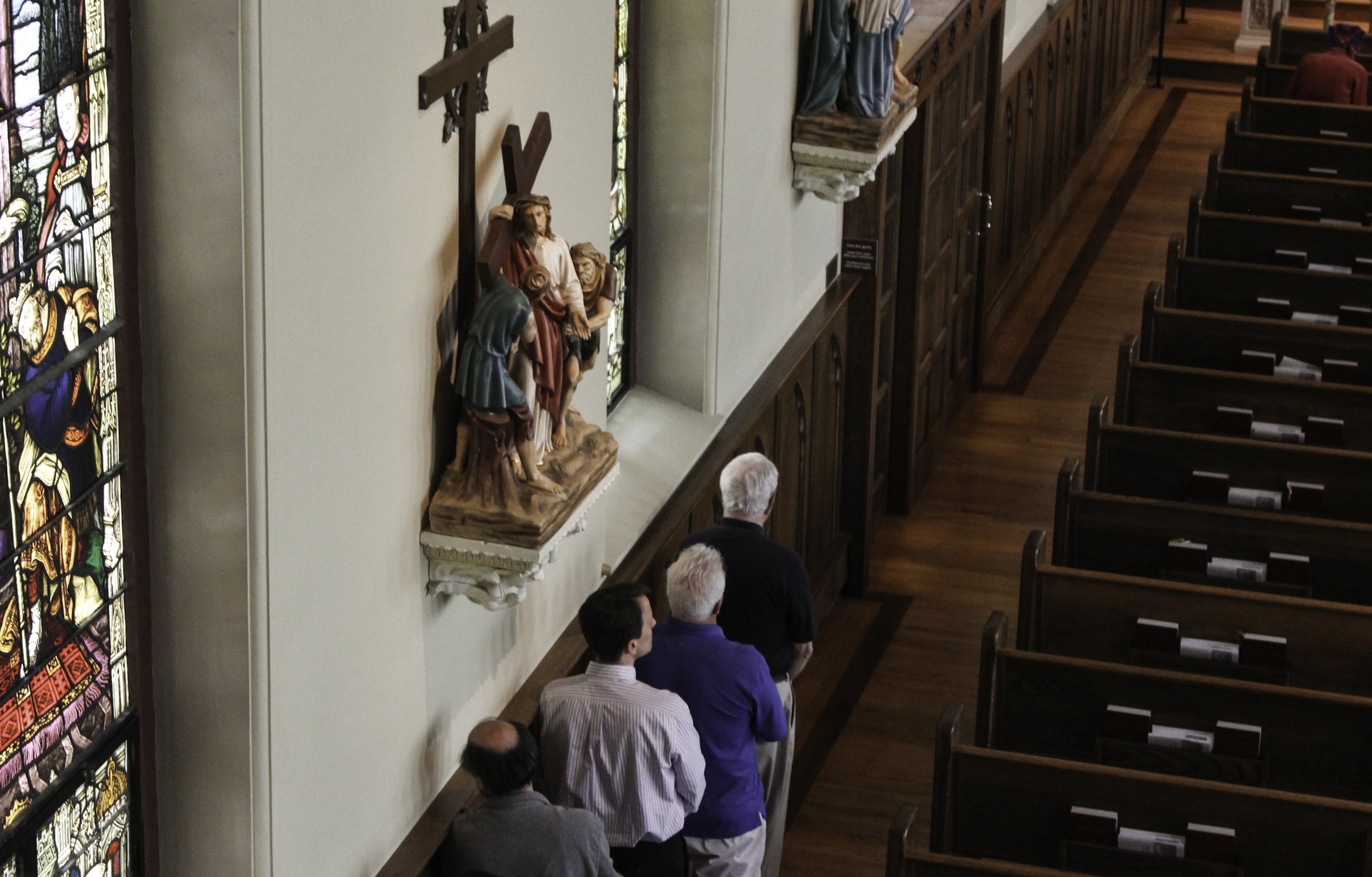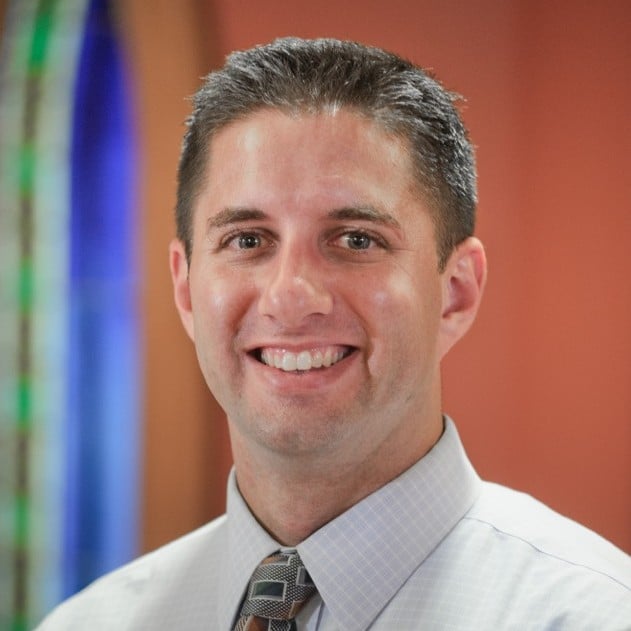The Year of Mercy is a call to action, but first of all, it is a call to contemplate the action of God. In the words of Pope Francis, “We need constantly to contemplate the mystery of mercy.” But contemplation is really hard work; it takes tremendous effort to learn to receive well, to take up a posture of willed passivity in the manner of Jesus’ Immaculate Mother who “[heard] the Word of God and [acted] on it” (Lk 8:21; cf. Lk 1:26–56).
God’s merciful action toward us frees us to act mercifully toward one another, and coming to know ourselves as recipients of God’s mercy teaches how to see the possibilities for merciful relationships in the first place.
Therefore, I would like to propose three practices for taking up the challenge of contemplating divine mercy. These three practices are at once simple and demanding; in full, they affect our language, our silence, and our manners of accompaniment. By praying the psalms, adoring the Blessed Sacrament, and engaging in the Sacrament of Reconciliation, we may come to contemplate more deeply what it means to be “merciful like the Father.”
The Mercy of Language: Praying the Psalms
Praying the psalms forces you to move beyond your own ideas, feelings, moods and predilections. Those who pray the Liturgy of the Hours know this all too well, especially when some of the first words you have to say each morning are, “Come, let us sing joyfully to the Lord; cry out to the rock of our salvation” (Ps 95:1). I imagine I’m not the only one who doesn’t naturally begin the day with a desire to sing and proclaim joy. Typically, I begin with a desire to return to the slumber whence I came, or at best, I thirst for the excess of caffeine upon which I have trained my body to depend. In the most mundane way, the practice of praying the psalms can redirect the desires implicit in a morning routine as they introduce you to what does not come from you alone.
Of course, there is more at stake in the psalms than just disrupting caffeine addictions. In her book that crafts a Christian response to her own mental illness, Darkness is My Only Companion, Kathryn Greene-McCreight ponders the meaning of the psalms in the midst of her prolonged bouts of depression:
Is it possible for the depressed soul to be grateful? . . . . Sometimes I think the only way for me to be grateful is to pray the psalms. To pray the prayers of Israel. To wrap my tongue around the gracious words of those before me in the Faith, in hopes that their words will nourish my soul, somehow sink in and sprout trees of righteousness, burst into songs of hope. Because I have no words of gratitude in me, only horror and shame at my absolute hardness of heart. (83–84)
In the psalms, we find the words of the whole human condition, of the whole of humanity that the Son of God takes on as his own. Those who are sleep-deprived confront joy while those who are depressed confront gratitude. At the same time—and from the other direction—the joyful must converse with the sorrowful and the grateful feel the chill of despair. This unlikely exchange exists because our ineffable God first humbled himself to speak our words and create new possibilities in our own terms. To pray the psalms is to join with all those who cannot always speak for themselves and, thus, to experience the mercy of relying on the speech of another.
The Mercy of Silence: Adoring the Word
Part of the Lord’s work to redeem our speech is reminding us that we tend to talk too much. I once heard it said that, “Silence is purgative of idolatry.” I consider this a pretty remarkable claim, not only because of the power attributed to silence but also because of what it implies about prattle. This all makes me think of Eucharistic adoration. I have witnessed adoration services with flashing lights and rock music, while I have also found myself in quiet and unassuming side chapels. Regardless of the setting, the one constant is that the Blessed Sacrament is silent. Maybe that’s the silence that purges idolatry.
Idolatry stems from the force of presumption. To presume to control meaning, to know too much, to be powerful on your own, to have authority over the lives of others . . . all this presumptuousness and more gives rise to idols that we adore. But the force of presumption ultimately exhausts itself while God abides, waiting all the while. The power of God is the freedom not to fight force with force. During Eucharistic adoration, the one who is the Word remains silent before us. He waits for us to listen to each other.
If the psalms lead us to take on words and conditions not our own, then Eucharistic adoration invites us, among other things, to sit with the needs and concerns of others before the silence of our patient Lord. What does Christ gather into his Sacred Heart but the needs and concerns of those he loves (cf. Jn 17)? In the practice of adoring the Blessed Sacrament, we join with those who suffer alone and with the dead who are shrouded in silence; we practice a form of abiding that they, in their suffering and stillness, can do nothing but practice. In the presence of the God who makes room for us in his silence, we practice making room in ourselves for others with our silence, breaking the reign of presumptuous prattle. The mercy of silence prepares the heart for solidarity.
The Mercy of Company: Practicing Confession
In the mercy of God, both the speaking and the absence of words communicate accompaniment. In the Sacrament of Reconciliation, accompaniment is communicated in an encounter. A student of mine recently used unconventional terms to express something akin to this reality, noting that when he wants to sympathize with a friend experiencing hardship, he tends to say, “that stinks.” The problem, he came to realize, was that he was actually preserving distance between the hardship and himself with the word “that.” Therefore, he vowed to try saying “this stinks” instead. There’s a startling insight here, which is that in mercy, the one who is not suffering joins in the suffering of another and seeks, in some way, to share in the burden itself. The sharing of the burden is the flip side of uniting your own good to the good of another. This happens in the confessional.
It is easier for those of us who practice sacramental confession to think about how far we go to make it to that confessional and hand over our sins. But have you ever thought about how far God goes to meet us there? No matter how far we travel, we would never reach God unless God came to meet us: the distance between Creator and creature is unspeakably vast. Regardless of the distance we’ve traveled, we are “still a long way off” when the Father catches sight of us, loves us and hastens to embrace us (Lk 15:20).
In the confessional, even when mired in our own sinfulness, we find someone who sits with us, listens to us, and responds to what is often our own incoherence. The words of absolution put into spoken language what the mercy of the confessional already communicates: We are not left alone in our sin. With unfathomable mercy, God allows the sinner to become the host in this place, welcoming the minister into his or her sin and thus transforming what was a lack of love into a place of companionship. In the sacrament, the mercy of God says not “that stinks” but “this stinks,” and by bearing the burden with the sinner in love, transforms that dead end into a new beginning.
God always makes the first move. God’s action provides the light by which we see in mercy (Ps 36:10).
Before, while, and after engaging in the actions of mercy during this Holy Year, we ought to practice contemplating the mercy of God in how we speak, how we remain silent, and how we receive company. Contemplating the mercy that comes to us is the wellspring of the mercy we share with others.
This article originally appeared in Our Sunday Visitor: Newsweekly on November 18, 2015 and is reproduced here with the permission of the publisher.
Featured Photo: Lawrence Lew, OP; CC BY-NC-ND 2.0



